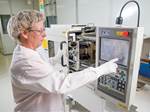Does ‘Scientific Molding’ Make a Difference?
Medical molder MRPC, for one, swears by it.
MRPC, for one, swears by it. The results, the firm's managers say, are less scrap, faster startups, more repeatable setups, more stable processing, and better troubleshooting. As reported in our February Processor Strategies, this $20 million medical custom injection molder in Butler, Wis., launched a program last year to train and convert all its 140 employees to the philosophy and methods of Scientific Molding. Two of its managers, Jeff Randall, v.p. of engineering, and Brunson Parish, senior process engineer, received formal training in Scientific Molding from some of the best trainers and consultants in the industry. Now they are training the rest of the staff—even material handlers—in what Parish calls a “´óÏó´«Ã½-changing method”—one that's becoming almost a necessity in the highly quality-conscious medical industry. There’s a white paper on the subject on the company’s .

Related Content
-
What to Look for in High-Speed Automation for Pipette Production
Automation is a must-have for molders of pipettes. Make sure your supplier provides assurances of throughput and output, manpower utilization, floor space consumption and payback period.
-
For Extrusion and Injection-Blow Molders, Numerous Upgrades in Machines and Services
Uniloy is revising its machinery lines across the board and strengthening after-sales services in tooling maintenance, spare parts and tech service.
-
BMW Group Vehicle to Adopt 3D Printed Center Console
A vehicle coming to market in 2027 will include a center console carrier manufactured through polymer robot-based large-format additive manufacturing (LFAM).





